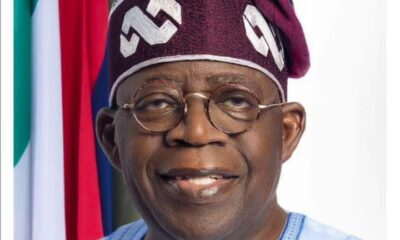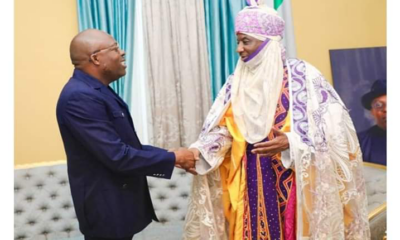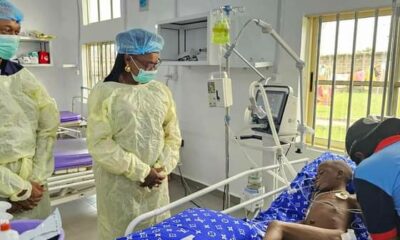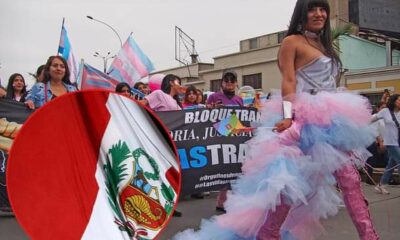News
Chimamanda Adichie ‘Falls Out’ with French journalist who asked if there’re bookshops in Nigeria


“Are there bookshops in Nigeria?” The question posed by a French journalist last week incensed acclaimed Nigerian novelist Chimamanda Ngozi Adichie.
At an event held in a ritzy Paris government building under crystal chandeliers, Adichie launched a blistering assault on perceived French arrogance.
“I think it reflects very poorly on French people that you have to ask me that question,” said Adichie.
“My books are read in Nigeria. They are studied in schools. Not just Nigeria, across the continent in Africa.”
The subsequent outrage on social media was perhaps predictable: insults hurled at the French journalist amid accusations of racism and colonial prejudices.
Adichie wasn’t done yet. The novelist, who was born in Nigeria but now lives in the United States, followed up with a Facebook post the next day arguing that the bookstore question was “giving legitimacy to a deliberate, entitled, tiresome, sweeping base ignorance about Africa”.
But not everyone wholeheartedly agrees. “You can’t say there aren’t any bookstores or libraries in Nigeria, that’s ridiculous,” Tabia Princewill, a columnist told AFP.
“But they aren’t pretty, and they are often religious books or educational books. In public libraries, there are almost no books,” Princewill said.
“It’s shameful and it is not being anti-Africa to admit it.
“The African elite don’t want to face the reality.”
– Polarising question –
The bookstore debate is so polarising because it isn’t just about access to books, it’s also about the country’s troubled education system.
As the population of West Africa’s biggest economy explodes, the government is struggling to educate its 190 million people.
Nigeria has a 60 percent literacy rate, one of the lowest among frontier markets, according to investment banking firm Renaissance Capital in a Tuesday note.
There are vast regional discrepancies in the country, with the south boasting much higher literacy rates than the north, yet teacher quality and student attendance are perennial problems.
In her Facebook post, Adichie acknowledged the devastating effect of the Boko Haram jihadist insurgency on bookstores in the northeast.
She said her uncle had owned a store in Maiduguri, capital of northeast Borno State and birthplace of Boko Haram, but it had to close down when the city began to feel “too unsafe”.
While the north struggles to counter the fundamentalist ideology of the jihadists, whose name translates to “Western education is forbidden”, the south has its own issues.
Neighbourhood bookstores in Lagos, the country’s commercial capital with 20 million inhabitants, have to contend with patchy electricity, subsequent mould, and a market flooded with pirated books.
– Pirated books –
Still, some find a way. Kayode Odumosu has always loved books and at age 11, he started working at his school library.
In 1993, Odumosu opened Lagos Book Club in Festac, a small middle-class neighbourhood. His 3,000 second-hand books are stacked tightly next to one another on long metal shelves.
“I sell Shakespeare and all of Chimamanda’s novels,” he says with pride.
On a recent day in Jazzhole — the bookshop Adichie describes as her “favourite in Lagos” — the power is out and the air is muggy. There are biographies of Afrobeat king Fela Kuti next to books on Tehran and Venice.
Owner Kunle Tejuoso took over the family business in 1975. “Well before the birth of Chimamanda,” he said with some amusement.
The bookstore controversy doesn’t bother him much. “I’m used to it,” he said pragmatically. “When Westerners come to my shop they always have a little shock.”
For all Nigeria’s problems, books are an integral part of its culture, he said.
“The literary scene is exploding in Nigeria, we have a lot of new writers who make young people want to read.
“Our greatest challenge is the internet. In the past, young people weren’t so easily distracted,” Tejuoso added, articulating a problem that affects bookstores both in France and Nigeria.
News
‘If You Want It Dirty, You’ll Get It Dirty’, Benue Diaspora DG Escalates Threat Against National Record Reporter
By Our Reporter
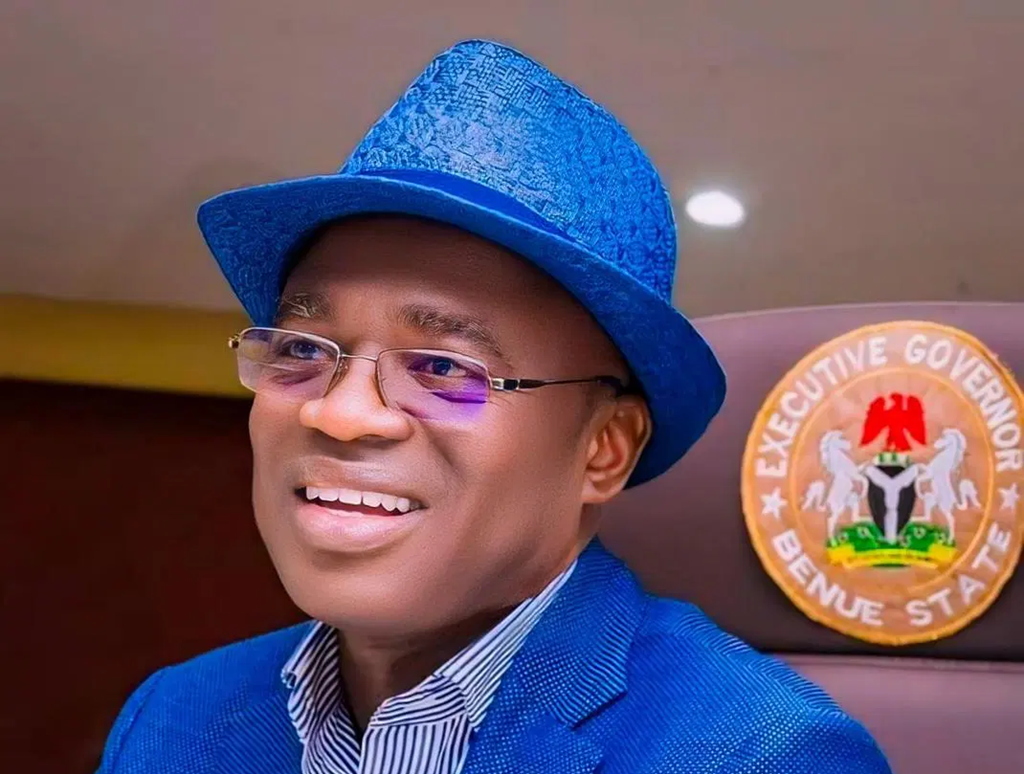

The Editor-in-Chief of National Record, Iduh L. Onah, has raised alarm over what he described as ‘grave threats’ issued against one of the online newspaper’s reporters, Mr. Amos Aar, by the Director-General of the Benue State Directorate of Diaspora Linkages and Investments, Professor Abraham Tartenger Girgih.
In a letter dated June 25, 2025, addressed to Prof. Girgih and made available to the press, National Record condemned what it called “unwarranted threats” following the publication of a report on the funding challenges being faced by the Directorate under the DG’s leadership since its formation in 2024.
According to Onah, while the publication welcomes robust engagement in the form of rejoinders on stories perceived to contain among other things misinformation, misrepresentation or distortion, no one has the right to issue threats.
“While it is within your right to respond to perceived misinformation or misrepresentation and distortion or outright fabrication, in any publication, it is, however, beyond that right to issue a threat as grave as “dire consequences”, Onah stated.
The Editor-in-Chief further noted that the situation escalated after the publication of a follow-up report when Prof. Girgih called the correspondent and made what the paper considers to be a further threat.
“After the publication of the threat and other claims in your rejoinder, you again went ahead to issue what we deemed to be further grave threat when you stated: “…if you want it dirty, you will get it dirty”, among other words perceived as veiled threat, in a telephone conversation you had with our correspondent shortly after you may have read our follow-up report,” stated the Editor-in-Chief.
The management of National Record expressed deep concern for the safety of its correspondent and other staff, especially given the hostile tone of Prof. Girgih in his conversation with the reporter.
The media organization said it is taking steps to notify security agencies, the Benue State Government, and professional journalism bodies about the threats, while also demanding a written assurance from Prof. Girgih that no harm will befall Mr. Aar or any member of the newspaper’s staff.
“We demand from you a written assurance of Mr Aar’s safety from harm and that of our other staff, and a further commitment to desist from harassing, heckling, intimidating or bullying us in whatever manner,” Onah wrote.
While no official response had been received from Prof. Girgih as at press time, National Record expressed hope for civility going forward and reiterated its commitment to its constitutional mandate as a stakeholder in the Fourth Estate of the Realm.
The letter reads in full:
Professor Abaham Tartenger Girgih
The Director-General
Directorate of Diaspora Linkages and investments
Makurdi, Benue State.
Dear Prof. Girgih;
THREATS ON OUR PERSONNEL AND ORGANISATION
On behalf of the Management of Contest Communications Limited, publishers of National Record, I bring you warm fraternal greetings.
We wish to express our dismay and concern over your threat on our Benue State Correspondent, Mr Amos Aar, in particular, and generally, our entire organisation, as contained in your rejoinder to a report we had published on challenges being faced by the agency which you head.
While it is within your right to respond to perceived misinformation or misrepresentation and distortion or outright fabrication, in any publication, it is, however, beyond that right to issue a threat as grave as “dire consequences”.
After the publication of the threat and other claims in your rejoinder, you again went ahead to issue what we deemed to be further grave threat when you stated: “…if you want it dirty, you will get it dirty”, among other words perceived as veiled threat, in a telephone conversation you had with our correspondent shortly after you may have read our follow-up report.
While we intend to take steps to formally note these threats before the appropriate security agencies, the Benue State Government under which you are serving, as well as our professional organisations nationally; we wish to inform you that the life of our Benue State Correspondent, Amos Aar, and our entire personnel, remains insecure in the context of your threats.
In that regard, we demand from you a written assurance of Mr Aar’s safety from harm and that of our other staff, and a further commitment to desist from harassing, heckling, intimidating or bullying us in whatever manner from carrying out our constitutional mandate as key stakeholders in the Fourth Estate of the Realm.
As we look forward to relating with you in formal, civilised manner, and prompt action on our demands, please, accept the assurances of our esteemed regards.
Iduh L. Onah
Editor-in-Chief
National Record (https://nationalrecord.com.ng)
News
Gov Mbah Inaugurates Committee to End Gender-Based Violence in Enugu


The Enugu State government has inaugurated a steering committee to eliminate Gender-Based Violence, GBV, in the state, declaring zero tolerance for the social malaise.
The inauguration took place at the Government House Enugu.
The panel, which is chaired by the Commissioner for Children, Gender Affairs and Social Development, Mrs. Ngozi Enih, draws its membership from the Nigeria Police Force, Ministry of Agriculture and Agro Industrialisation, Ministry of Local Government, Rural Development and Chieftaincy Affairs, Ministry of Human Development and Poverty Reduction, Ministry of Trade, Investment and Industry, Ministry of Justice, Ministry of Health, Ministry of Education as well as the Civil Society.
Inaugurating the panel known as the Steering Committee for Strengthening Institutional and Community Responses to End Gender-Based Violence/Domestication of Enugu State Gender Policy using the Oputa Panel approach, Governor Peter Mbah restated his administration’s commitment to not bringing perpetrators of GBV to book, but also putting in place proactive measures – activities, infrastructure, and systems in place to prevent them.
Mbah, who was represented by the Secretary to the State Government, Prof. Chidiebere Onyia, said, “We take gender-based violence seriously. We have zero tolerance for it, and in Enugu State, we are ready to go the extra mile to deal with it.
“If you notice, the government has selected people that are very committed to this goal. This is not an activity where we just want to check-off the list. We will track this. We will monitor this, and we will have quarterly engagements on the successes that this particular committee has achieved in terms of reference that we are going to send.
“We will tighten those terms of reference indicators, so that we monitor what we are doing both in terms of cost input and the value added. It’s very important to us. Many people will be involved – civil society, the police and various ministries.”
He however, said that the effort was to protect everyone, men and women alike, as GBV was not restricted to any gender.
“The whole idea is to hold people responsible that are involved in matters relating to gender violence and deter people that by culture or by association get involved in that, protect women, protect our children, and in the case of violence against men, protect our men because most times we misconstrue gender violence to mean women, but it can also be men too.
“We encourage our men to speak out and to make sure they understand that the policy that Enugu State is soon going to domesticate is for everyone, and not only for the female gender,” he stated.
In her remark, Mrs. Enih, explained that the Oputa Panel approach was inspired by the need to cover all local peculiarities in domesticating the policy on GBV, restarting government’s confidence in the members of the panel.
“The approach we are going to use is the Oputa Panel approach, and in the Oputa Panel approach, we are going to tour the 17 Local Government Areas to get firsthand information about what our people are going through because policy is meant for the people, and a policy should suit the people.
“Again, every community has its peculiar problems, so that’s why the government decided that if we have to domesticate the gender policy, we have to hear from the people who own the policy and know the changes that they desire to see. That is the reason we are using this approach.
“The committee members are to also serve as judges. As we gather this information from our people, we will come back to tailor it in a way to suit the people of Enugu State, and then our policy is ready.
“We want the people to know that there is a gender policy for them. I can assure you that when the people are aware that there is such a policy, they will seek for the enforcement of that policy. So, this is not going to be one of those policies that will just lie on the shelf,” she said.


Digital solutions provider, Globacom, has congratulated Christians in Nigeria on this year’s Easter celebration, and urged them to emulate the noble qualities of Jesus Christ.
The company, in a goodwill message to the Christian faithful in the country, lauded their perseverance through the Lenten period which preceded Easter. It enjoined them to always promote the ideals of selflessness, love and peace among all as a way of demonstrating the virtues of the exemplary life of Jesus Christ.
“Peace, love and sacrifice are the central message of Easter. Christ offered himself in atonement for the sins of the world and he lived a life which made Him an eternal symbol of peace and goodwill for mankind”, Globacom added.
The company enjoined all Nigerians to share in the lessons of promoting selflessness, a necessary ingredient in the growth and development of every society. It also enjoined all Nigerians to join hands to make Nigeria a better place for all.
Easter is celebrated yearly at the end of the Lenten season of fasting and prayer considered as a ritual of purification for the Christian faithful. It also precedes the crucifixion of the Lord Jesus Christ on Good Friday and His eventual resurrection on Easter Sunday.
The company assured its customers of seamless voice, data and Short Messaging Service (SMS) during and after the Easter celebrations, while urging them to avail themselves of the various data and voice offerings on the network.

